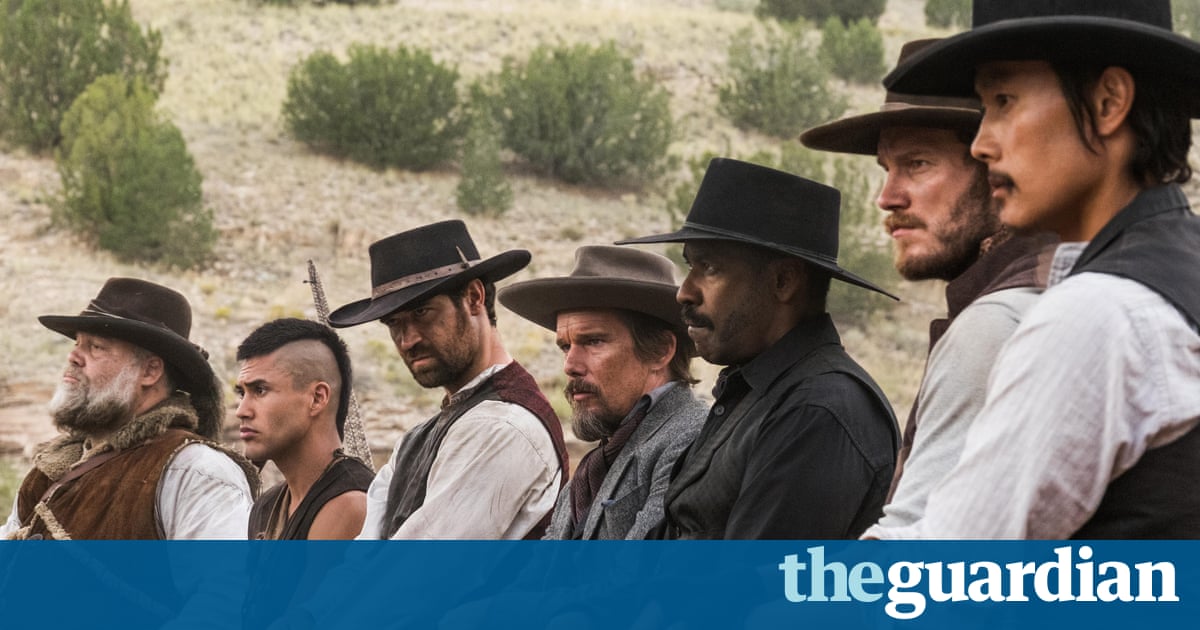The veteran actor joins Chris Pratt to discuss his remake of the classic western. But why are they so keen to play down its obvious radical political subtext?

It is mid-afternoon and the Venice Lido is a ghost town baking in the sun. The film festival wound down the previous evening, and now the thoroughfare between the beach and the cinemas is deserted except for construction workers in threes and fours dismantling the decorations. The glitz has faded. The stars are gone.
Well, most of them. Denzel Washington and Chris Pratt are the last men standing in this tumbleweed town. In the street, their faces loom menacingly out of the posters for the remake of The Magnificent Seven, in which an ethnically diverse cast of outlaws and miscreants defend oppressed townsfolk from a brutal tyrant. Seated at a table in a hotel room, the actors appear somewhat less than magnificent. Washington is slumped in his seat. He is 61, heavy-set, tired-looking. He may be dressed in a baggy, grey T-shirt and jogging bottoms but his magnetism is undimmed. When he peers straight at you, theres a crackle of electricity in the air. Those arent ordinary eyes: theyre the eyes of all the indomitable men hes played, from Steve Biko to Malcolm X, the boxer Ruben Carter in The Hurricane to the drug lord Frank Lucas in American Gangster. He sweats gravitas.
His 37-year-old co-star who is wearing jeans and a thin suede jacket, and sporting a sketchy beard carries his fame more lightly. Pratt made his name as a deliriously dopey member of the Parks and Recreation ensemble. Superstardom only descended, though, once his loosey-goosey charms were transposed to a blockbuster setting in Guardians of the Galaxy and Jurassic World. A second Guardians movie is due next May.
For now, its all about The Magnificent Seven. Except neither Washington nor Pratt seems especially keen to go on the record about any resonance the film might have in the wider world. With a cast list that offers a rebuke to conventional Hollywood casting (theres even a woman among the seven heroes) and a conflict that pits poor against rich, the movie is in the tradition of westerns that comment on our times, such as Soldier Blue or The Wild Bunch. The films director, Antoine Fuqua, who coaxed Washington toward an Oscar-winning performance as a corrupt cop in Training Day, has said westerns reflect where we are in the world. So where exactly are we?
Pratt wrinkles his nose. Everything reflects, he says. Mirrors reflect. He lets that comment hang in the air. Im just not sure exactly what that reflection looks like. Washington has a stab. Audiences like to know who theyre rooting for, he says. I remember going to the movies and having that feeling I wanna be that guy. Unfortunately, that was the 1970s so it was usually drug dealers: Im gonna be a dope dealer like him!
Still keen to hear how their Magnificent Seven relates to society today, I press the point. Why make the film now? Youre putting too much on it, man! Washington hoots. Its a movie. Antoine was excited about westerns. He grew up watching them with his grandma. He wanted to see me and Chris riding on horses. Next thing I know He mimes trotting along on horseback, invisible reins in his hands. It wasnt, like: How are we going to reflect society?
Point taken. As Washington pointed out in 1990, Guys wont spend $15 on Friday night to take their girls to see [Cry Freedom, in which he played Steve Biko]. Making movies like that shows that were committed to doing something about the issues, but people can see issues on the news for free. But doesnt The Magnificent Seven fall into the category of entertainment that carries a thoughtful, progressive message? Thats for the audience to decide. Well see. No hidden baggage over here! He raises his arms, as though inviting me to frisk him. Im sorry if Im not deep enough for you. Im trying! Im trying to get there.
Read more: www.theguardian.com








![[Video] How to get rid of bed bugs in Toronto](https://www.thehowtozone.com/wp-content/uploads/2019/10/maxresdefault-2-100x70.jpg)


